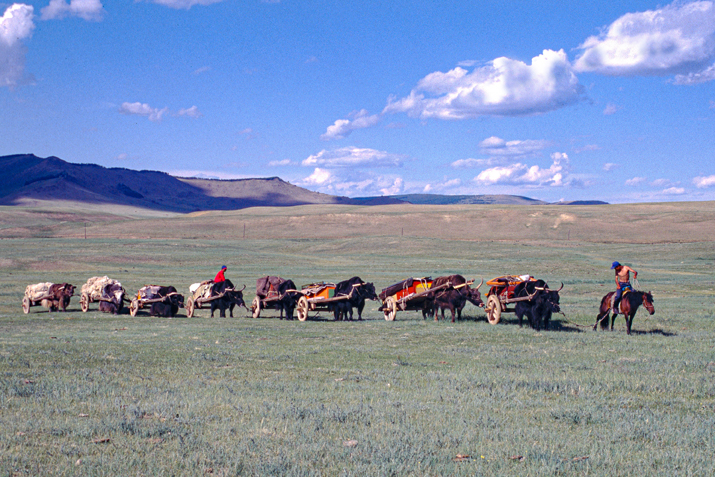
Missing reindeer, the bear’s paw and earthquakes
N 51°33'336'' E 099°15'341''
Day: 156
Sunrise:
09:28
Sunset:
17:19
Total kilometers:
1281
Temperature – Day (maximum):
minus 17°C
Temperature – day (minimum):
minus 25°C
Temperature – Night:
minus 30°C
Latitude:
51°33’336”
Longitude:
099°15’341”
Maximum height:
1981 m above sea level

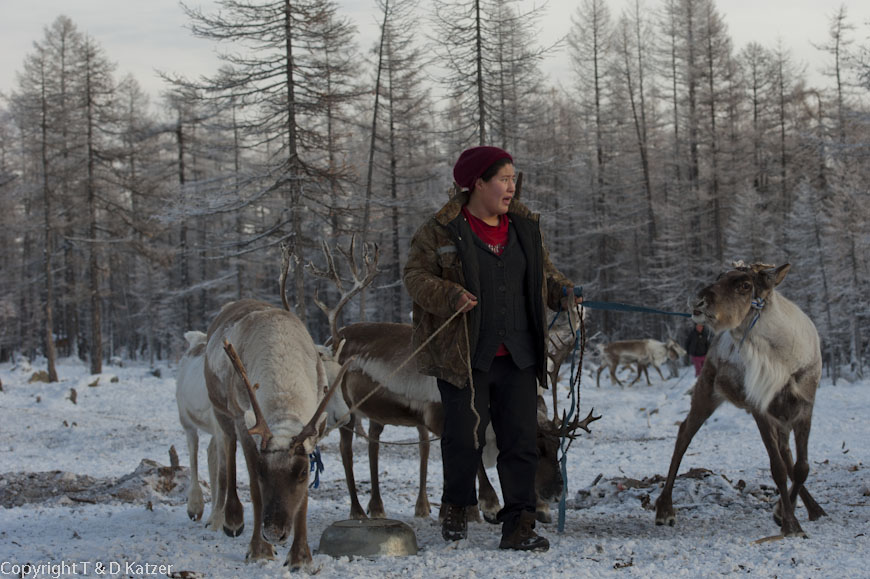

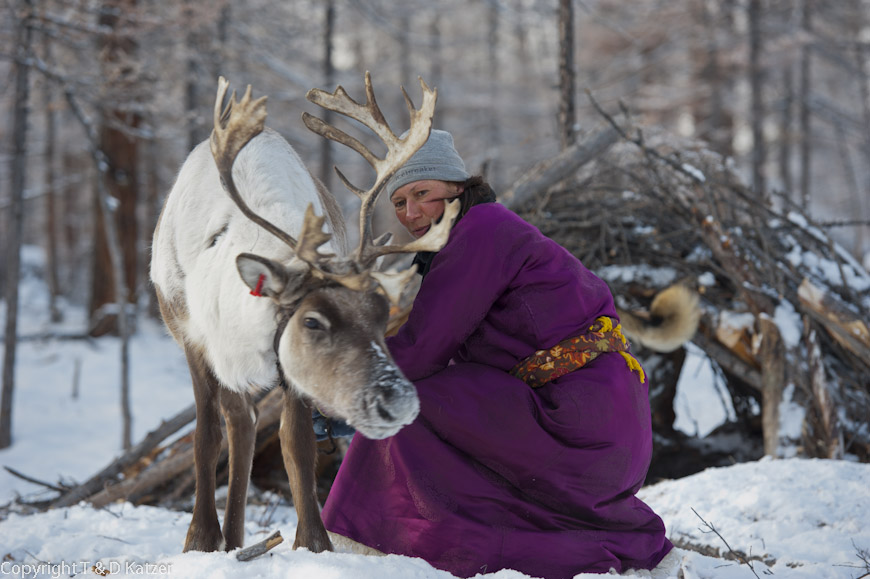
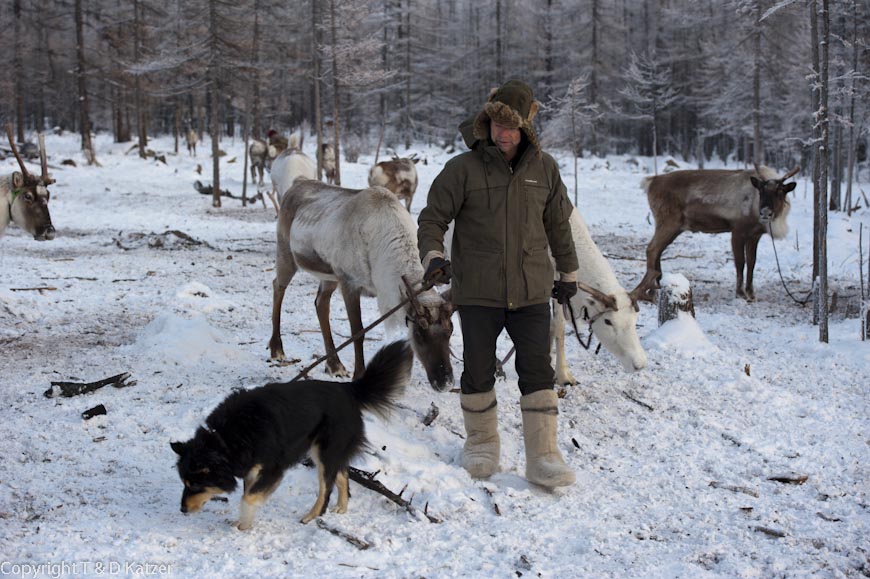
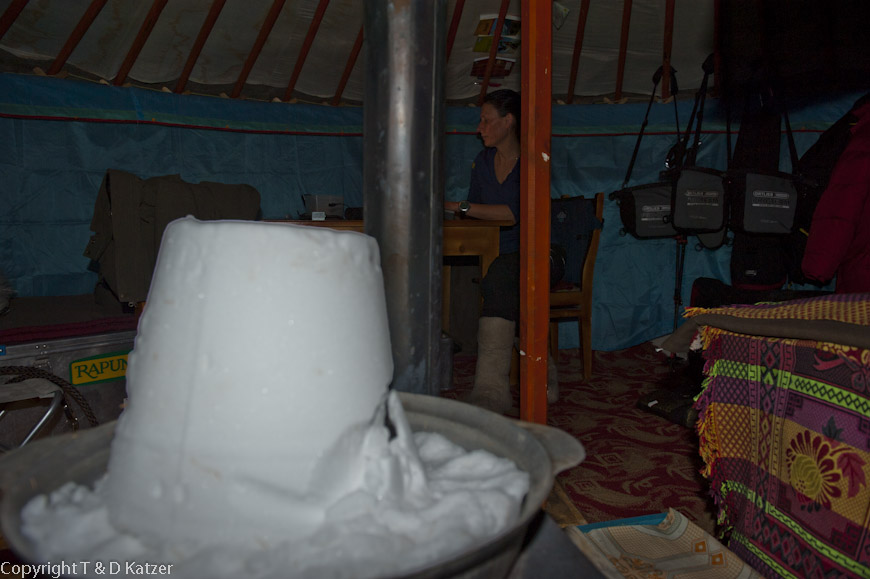
“What are you wiggling around like that for?” asks Tanja. “How? I’m not wobbling,” I reply. “Are you trying to annoy me? You’re wobbling again. And even more than before.” “Man, I’m not wobbling! You’re probably wobbling around like that! I rather have the feeling that you’re the one who wants to annoy me.” “Well, not me. Can’t you feel how our whole wall has moved? And now again. Can’t you feel that?” “Of course I can feel it. I’m not insensitive.” “Maybe it’s an earthquake?” Tanja ponders. “Of course an earthquake. I’m not laughing. Do you think a reindeer is munching on our yurt?” I guess, get up, slip into my big felt shoes and leave the yurt. “Nothing to see. No animals at the yurt,” I say. “Not a brown bear either?” jokes Tanja. “No, not a brown bear either,” I reply with a laugh, hang the hook on the yurt door back up, take off my felts and crawl onto the Wanda. “That’s strange. I definitely felt our entire bed move several times,” Tanja reflects. “Me too. So we weren’t imagining it,” I reply sleepily.
The next morning I leave the yurt to fetch firewood. I meet Tsaya at the same job. “Did you feel the earthquake too?” she asks. “An earthquake? Yes, our wall shook several times. Tanja thought it was me at first. Then we thought a reindeer had nibbled on our yurt. How do you know it was an earthquake?” I ask her. “I called my mother in U. B. on the phone. She looked it up on the Internet. They reported that there was an earthquake in Siberia.” “Hm, I hope it didn’t cause any serious damage?” “I don’t know that. It certainly didn’t for us. Our log cabin is still standing,” she replies with a smile, fleeing from the cold into her wooden hut.
We take a lot of time to settle in with the Tuwa. We don’t want to visit them in their tipis right at the beginning of our stay. Drop the door into the tent, so to speak, and say: “Here we are. May we photograph and film you? Or maybe tell us something about your rites? Or can we take part in one of your shamans’ ceremonies?” Even though these people are in constant contact with the outside world, indeed a large proportion of them live outside in Tsagaan Nuur and some young people even study in Ulan Bator, we believe it is important to proceed with caution and allow a sense of togetherness to grow.
In summer, Tuva is often visited by tourists from all over the world. They are constantly photographed and filmed. People sit down in their tents and are served tea and bread. Often without thinking about how difficult it is to get food out here. That can certainly be stressful. And that’s exactly what we don’t want. Every photo that we capture in our cameras should also be taken with the will of the person photographed. So we need time and patience.
behavior, they start to visit us and are happy about coffee and pastries. As already mentioned, a rare treasure in the taiga. We hadn’t expected the coffee to be met with such great love and hope that the supplies will be sufficient. But even when they come to an end, we find something with which we can give these people’s palates a change and pleasure.
In the evening there is excitement in the Tuwa camp. “What’s going on?” we ask Tsaya. “Two reindeer are missing. We have to go and look for them. They might have been attacked by wolves,” she explains. Ultsan lifts a saddle onto the back of one of the mounts, shoulders his large-caliber rifle and trots off at astonishing speed.
To give Mogi a bit of exercise, I put him on a lead and take him for a walk through the snowy forest. Suddenly I notice a movement in front of me. I remain frozen in place. “There are two reindeer,” I whisper to Mogi. They slowly come in my direction. I quickly tie Mogi up. “Just don’t bark,” I admonish him and run towards the white animals. Her left hind leg is connected to her neck with a cord. This makes it impossible for them to cover long distances or flee quickly. Not an advantage in the event of a wolf attack, but helpful for herding them. Excited to catch one of them and bring it to the Tuwa, I think about how I am going to manage to catch it. Then an idea comes to mind. About 20 meters before the first reindeer, I stop, unzip my trousers and pee. As soon as the beam hits the snow, the reindeer raises its head with interest and comes running to my delight. It immediately begins to eat the yellow snow. I concentrate and grab the rope quickly and courageously. “Gotcha,” I say happily and tie it to one of the many trees to try my luck with the second animal. Unfortunately, there is hardly any stock left in my bladder. But it’s enough for a quick spritz. It immediately arrives to eat the treat. Reindeer really like it because of the salt content in their urine.
Without showing my pride, I return to camp. Two reindeer on a rope in his left hand and Mogi in his right. Suddenly there are lots of reindeer behind me. Driven by Ovogdorj, one of the elders of the community. Suddenly I don’t feel so proud any more, because the two reindeer I’ve caught probably belong to his little herd that he’s driving into the camp. When I hand it over to him a little later, Ovogdorj thanks me profusely and smiles warmly at me. His laughter comes tangibly from an open heart. If I interpreted it correctly, he understood my action as a well-intentioned act that would be well received by the people here.
Tsaya and Ultsan visit us again in the evening. “How are you?” I ask Tsaya because I have the impression of seeing something pained in her expression. “Oh, I have a toothache,” she replies. “Toothache? Oh, that’s not good at all. Especially when you live in the taiga,” I reply, thinking to myself. “Yes, it’s not good. Ultsan tried to pull my tooth but it didn’t work.” “Pull it? How is that possible?” I wonder. “We have a pair of pliers. But they kept slipping off. It really hurt. I then pricked the lump with a needle. Hope that helps,” she shocks us. “You stuck a needle in your gums?” “Yes.” “Well, I hope it was sterilized?” “It was a new needle,” she replies, stroking her cheek.
Over coffee and sweet cookies, we talk about the lonely life in the taiga and hunting, which is as much a part of life for the Tuwa people as sunrise and sunset. Ultsan continues his story where he ended it last night.
“My favorite thing to hunt is chamois. They are not easy to catch and you need good dogs that are able to calculate the animal’s escape route. But the most dangerous animals are and remain wild boar and bears. “Are good hunting dogs important to you?” I ask. “But yes. Without dogs, the success of a hunt would be very low. We have very good hunting dogs here at the camp. However, they can only be used in the taiga. Outside, they attack sheep, goats and young cattle.” “What? Your dogs also hunt sheep?” asks Tanja. “But yes. They actually tear everything except reindeer. That’s what they’re trained for. When we ride to Tsagaan Nuur, we have to tie them up well here in the camp. Once, however, one of our dogs got loose and followed us. He killed four sheep on the way to Tsagaan Nuur. We all had to pay,” we hear and have to laugh. “Sorry, but that’s too funny. Our Mogi also loves to bite sheep in the butt. He caused us a lot of trouble on the way here. Once we had to pay, but we didn’t get the sheep. I hope you fared better and were able to take the killed sheep with you?” I ask. “Yes, we could.” “That’s good. Mogi would actually be a good dog for you. However, we don’t know whether he would also chase your reindeer. Especially the young ones. He grew up in the city and has never had anything to do with other animals,” Tanja explains. “Your dog is a strong and courageous dog. I’ve noticed that he’s not afraid of anything. Would be a good dog for bear hunting,” replies Ultsa. “Hm, I don’t know. I think his chances of survival would be extremely slim. The bear would kill him immediately,” I say thoughtfully. “Could be. However, most dogs are injured or killed when hunting wild boar. But when a dog has gained enough experience, it won’t let itself be killed so quickly.
I remember when I was hunting with my brother. One of our dogs suddenly stopped and put his head to one side. We watched him as he peered curiously into the earth. “Could be a bear’s den?” my brother said. I thought it was impossible as the elevation of a cave or pit could not be made out. However, bears are very intelligent. They bring the earth for their construction from many kilometers away. They walk on their hind legs and carry the excavated material in their front legs,” explains Ultsan. “Why are they doing that?” I wonder. “To cover their tracks. They usually never dig where their cave is but bring the building material from far away. So their winter camp is impossible to spot. Coming across it would be pure coincidence. “So, what did your dog see in the ground? Was it a bear’s den?” I ask to hear the rest of the story. “Well, yes. We just didn’t know. We stood in wait behind the trees and observed the situation. Although I didn’t believe I had discovered a bear den, it could still be one. Dogs can hear the bear snorting. And there was no question that our dog had spotted something. We had been standing in our hide for maybe 30 minutes when I almost dropped my rifle in shock. Suddenly, a paw shot out of the ground, narrowly missing our dog. He squealed with fright and jumped to the side just in time. Just a fraction of a second later, a large brown bear burst up through the earth to snatch the dog. He hadn’t realized that there were people nearby. Otherwise he would never have gotten out. It only took a blink of an eye for us to recover from the shock and shoot. The bear was dead immediately,” says Ultsan. “Was he as thin as the one who almost killed you all?” I ask. “No, it was a well-fed animal. We were able to utilize everything and feed our tribe for some time.”
“We have to go,” Tsaya urges her husband. “The Korean drama?” I ask. “Yes, a new episode,” she replies. “See you tomorrow then,” I reply. “You’re always welcome,” Tanja says, inviting them back to us.
We look forward to your comments!

